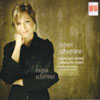Schumann Symphonic Studies
Scholarship without magic: Schirmer turns Schumann’s poetry to prose
View record and artist detailsRecord and Artist Details
Composer or Director: Robert Schumann
Label: Berlin Classics
Magazine Review Date: 9/2006
Media Format: CD or Download
Media Runtime: 58
Mastering:
Stereo
DDD
Catalogue Number: 0017862BC

Tracks:
| Composition | Artist Credit |
|---|---|
| Variations on a theme of Beethoven |
Robert Schumann, Composer
Ragna Schirmer, Piano Robert Schumann, Composer |
| Etudes symphoniques, 'Symphonic Studies' |
Robert Schumann, Composer
Ragna Schirmer, Piano Robert Schumann, Composer |
Author: Bryce Morrison
With this CD Ragna Shirmer creates a cat’s cradle of intricate Schumann scholarship. Prefacing the Etudes symphoniques with the Beethoven Variations, she suggests a revealing relationship. A memory of Schumann’s thwarted ambitions as a virtuoso pianist, the Variations abound in thorny difficulties ranging from rapid unison and contrary motion, treacherous skips and typically peg-leg syncopation. Yet all this is subordinated to Schumann’s quixotic and poetic nature. Shirmer has edited Schumann’s sketches (unpublished complete until 1976) to form a sequence alive with hints of the Etudes symphoniques’ long gestation. Then in the Etudes she not only observes all repeats and quotes from the music’s earlier edition (chiefly in the jubilant finale) but offers the five posthumous etudes and a sixth (tr 33) never before published, scattering them judiciously through the more familiar set.
All this would be treasure indeed if only it were presented more glowingly and imaginatively. Schirmer is capable if heavy-handed in the Variations but in the Etudes terms such as un poco più vivo, vivace and con energia elude her entirely; she is embarrassingly tame in the snapping accentuation of Etude 4 and sinks gratefully into misplaced repose in the agitato of 6. The posthumous Etude (following Etude 10, tr 31) is a key example of a pianist who turns even the most ravishing poetry into prose (for Schumann a cardinal sin). And so for an iridescent sense of fantasy and freedom that can change what can often seem one of Schumann’s more doughty offerings into a magical interplay of light and shade, the listener will have to look elsewhere, and most of all to Testament’s reissue of Géza Anda’s 1953 Columbia LP. Finely presented and recorded, Ragna Schirmer’s disc is of greater academic than musical value.
All this would be treasure indeed if only it were presented more glowingly and imaginatively. Schirmer is capable if heavy-handed in the Variations but in the Etudes terms such as un poco più vivo, vivace and con energia elude her entirely; she is embarrassingly tame in the snapping accentuation of Etude 4 and sinks gratefully into misplaced repose in the agitato of 6. The posthumous Etude (following Etude 10, tr 31) is a key example of a pianist who turns even the most ravishing poetry into prose (for Schumann a cardinal sin). And so for an iridescent sense of fantasy and freedom that can change what can often seem one of Schumann’s more doughty offerings into a magical interplay of light and shade, the listener will have to look elsewhere, and most of all to Testament’s reissue of Géza Anda’s 1953 Columbia LP. Finely presented and recorded, Ragna Schirmer’s disc is of greater academic than musical value.
Discover the world's largest classical music catalogue with Presto Music.

Gramophone Digital Club
- Digital Edition
- Digital Archive
- Reviews Database
- Full website access
From £8.75 / month
Subscribe
Gramophone Full Club
- Print Edition
- Digital Edition
- Digital Archive
- Reviews Database
- Full website access
From £11.00 / month
Subscribe
If you are a library, university or other organisation that would be interested in an institutional subscription to Gramophone please click here for further information.




